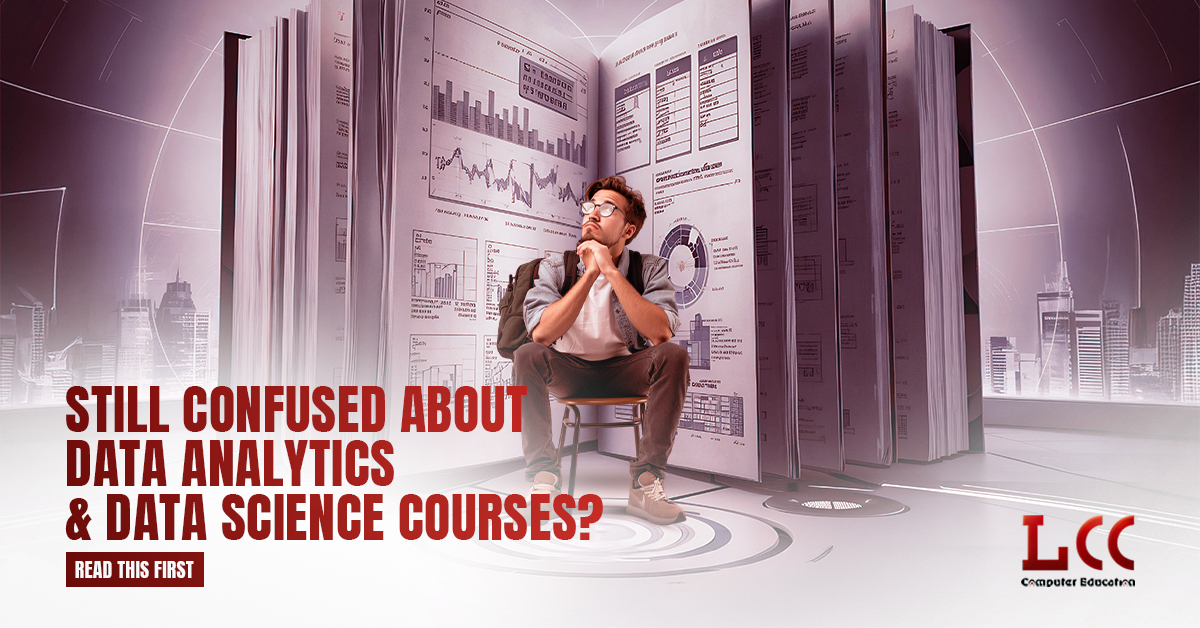
Let’s be honest—if you’ve started exploring courses like a Data Analytics, you’ve probably bumped into another big term: Data Science. And now the confusion begins. Both are valuable, both are in demand, and both are likely to pay good salaries. So how do you even know which is right for you?
Take a deep breath. You do not have to work it all out at once. Let us simplify things so that you can make a choice with confidence.
First, what exactly is data analytics?
Imagine you’re given a huge set of sales numbers for a company. The task is to make sense of them—see what’s working, where things are dropping, and how to improve. That is what a Data Analyst does: he/she processes raw data, cleans it, and finds patterns that will answer the questions of what and why.
Data Analytics is applied and operational. You use Excel, SQL or visualization software to present insights in a form that managers and teams can take action on.
What is data science?
Now imagine going further. Instead of just explaining the past, you’re asked: What’s likely to happen next? Data science handles that. It uses advanced methods—programming, statistics, even machine learning to build models that predict outcomes and guide long-term strategies.
While analytics explains, science predicts.
Data science is not a mere matter of code or number crunching, but rather an expansion linking the dots between raw information and real-life decision-making. It enables the companies to not only predict the behavior of the customers but also predict demand, identify risks and even achieve individualization. Data science enables organizations to gain a strong competitive advantage in the competitive markets by combining domain knowledge with computational techniques that are necessary in converting information into foresight.
How to choose between Data Science and Data Analytics courses
This decision depends less on which is “better” and more on what suits you.
- If you like numbers, enjoy spotting patterns, and want to get into the job market quickly, analytics is a great start.
- If coding and maths excite you, and you want to design predictive systems, science could be your choice.
- Many learners start with analytics and later shift into science once they’re ready for deeper technical work.
Career in Data Analytics
Don’t underestimate Analytics—it’s one of the most in-demand career paths today. Almost every industry needs analysts: finance, healthcare, retail, IT, government, and more.
A career in data analytics often begins with roles such as data analyst, business analyst, or marketing analyst. These jobs focus on turning data into useful insights for decision-makers. The best part? To start with, you don’t need to be a pro in coding.
With proper training, you will be able to master such critical tools as Excel, SQL, Power BI, and Tableau which are the fundamentals of the analytics work. As time goes on, you might expand to more specialized positions such as data engineer, machine learning engineer or data scientist. The need is enormous since companies worldwide are employing data-driven approaches in order to remain competitive. Because, seeking analytics does not only provide you with a job, it provides you with a career with flexibility, growth and relevance in any industry.
Future of Data Analytics and Data Science
The two industries are expanding at an alarming rate. The role of analytics in decision-making in the routine management of businesses will remain significant, but the future of data analytics and data science is likely to be influenced by AI, automation and smarter predictions. The point is that neither of the two is going any time soon. Whether you choose analytics or science, your skills will stay relevant in the coming years.
Job opportunities in Data Analytics
What then can you expect after taking an analytics course? The least challenging ones are Data Analyst or Business Intelligence Analyst. With experience, the Job opportunities in Data Analytics expand into senior positions or specialized fields such as healthcare analytics or financial analysis.
Why the right institute matters
You can learn the concepts, but it is the application that will make you job-ready. This is the reason why it is necessary to select a good institute. LCC Cochin is one of the institutes that specialize in practical projects and practical tools, a factor that makes students feel confident.
FAQs
What is the main difference between Data Analytics and Data Science?
'Analytics' refers to the description of past trends in data, whilst 'data science' is a more advanced concept, the application of techniques such as machine learning to predict the future of some data.
Is data analytics or data science better?
Neither is “better”. It depends on your interest - Analytics is business-oriented and practical, whereas Data science is predictive and more technical.
Can I switch from Data Analytics to Data Science later?
Yes. Many learners start with analytics, then move into science once they build programming and maths skills.
What is the salary difference between Data Analysts and Data Scientists?
Data scientists are more likely to be paid more because of their expertise. Analysts, however, also enjoy competitive salaries with steady growth.
Does LCC Cochin provide both data analytics and data science training?
No, LCC Cochin focuses exclusively on Data Analytics training. Their program is designed to equip learners with strong analytical skills, making it a great choice for those aiming to build a career in the data field.
Is data analytics easier than data science?
Generally, yes. The learning curve of analytics is also less steep than the technical sophistication of data science, so it is an excellent place to start a career in data analytics.
Wrapping up
It is absolutely normal to feel stuck between the two courses. The key is to think more about what interests you more: to solve the present-day problems using data or to predict the future. Anyway, these two fields have too many opportunities to offer you.And when you start you will know that the first step is the most important one.
